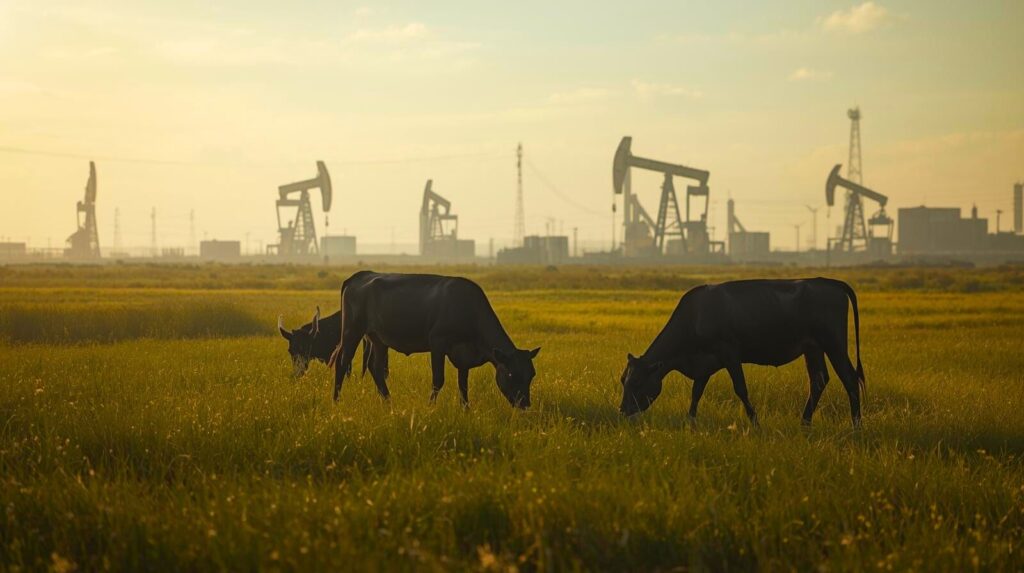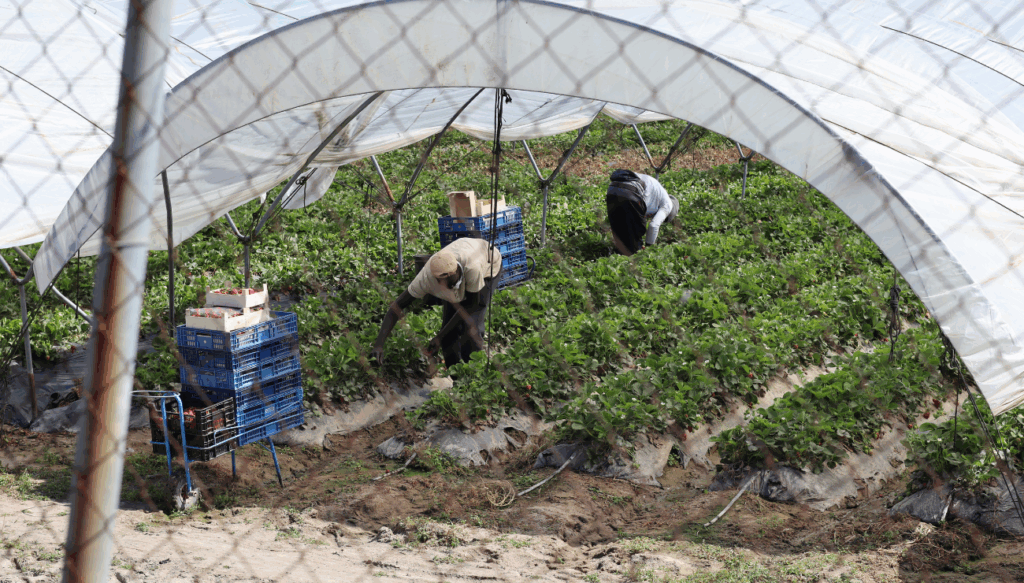On 18 November 2020, DeSmog published an investigation into the pesticide industry’s climate change PR campaigns. The investigation launched DeSmog’s Agribusiness Database, which compiles a record of companies and organisations’ current messaging on climate change, lobbying around climate action, and histories of climate science denial.
The investigation examines climate-focused communications by pesticides manufacturers and by advocacy organizations with links to agribusiness. As the investigation found, just a handful of companies dominate the pesticides market: Bayer (which acquired Monsanto in 2018), Corteva (formerly Dow and DuPont), Syngenta, BASF and FMC. Many of the organizations included in DeSmog UK‘s agribusiness database have promoted regenerative and/or precision agriculture strategies. Outside experts and environmental groups have warned that advocates may be creating outsized expectations about the impact that these strategies can have on addressing climate change.
We asked companies and organizations questions about their views on the climate crisis, regenerative agriculture and precision agriculture strategies and what role pesticides should play in responses to the climate crisis. Below are responses, in full, from the companies and organizations that responded to questions sent by DeSmog UK:
BASF
“BASF considers sustainable agriculture as a key area in reducing negative climate impacts while continuing to support the sustainable production of healthy, high-quality food. We support farmers worldwide to address the challenges they will face due to the expected changes in farming conditions. We are committed to help making farming more productive and resilient and to reduce the GHG footprint of agricultural production. In crop protection, we continue to focus our research and development efforts on ever higher efficiencies with simultaneously decreasing application rates.
“At the same time, digital and precision technologies will enable a more targeted application of crop protection products, protecting areas in the vicinity of the fields. BASF leverages the potential of digitalization in farming to help farmers reach higher yields with fewer natural resources and crop inputs. Digitalization offers great opportunities to promote resource-efficient and sustainable farming, as well as the potential to reach a vast number of farmers, including those in less developed countries, to increase knowledge and raise awareness of on-farm sustainability. Under the brand xarvio™, BASF is offering the xarvio™ Field Manager and the xarvio Scouting app to help growers farm better with less.
“Another important element for climate-smart agriculture is no-till farming or conservation agriculture. It is a method of growing crops without tilling or disturbing the soil. No-till farming increases soil fertility by retaining more organic matter and encouraging larger amounts and variety of life in and on the soil. The practice also aids in the soil’s ability to retain water, conserving the soil structure, reducing the risk of soil erosion, and making soils more resilient. Conservation farming systems need to make best use of technologies, including GM seed and crop protection, in order to reduce the need for tillage to a minimum.”
Bayer
On the role of pesticides in the world’s response to climate change: “Agriculture has a vested interest in being part of the solution to climate change. Farmers are on the front lines of the fight to slow climate change. Their lives and businesses depend on the weather, and they are some of the first to be affected by drought, flooding and extreme conditions. Modern practices give growers more tools than ever to keep carbon out of the atmosphere. With better weed-control solutions, farmers reduce the need to till, decreasing tractor passes over the field and allowing for less soil disruption. This not only curbs greenhouse gas emissions and fossil fuel use, but when soil is left untilled it is better able to store carbon, as well as nutrients and water.
“Bayer promotes practices and products that inspire more sustainable agriculture, including reduced- and no–till farming. One example is specialized soybean products that thrive without heavy insecticide and herbicide application. The product minimizes fossil fuel use and retains more carbon in the soil. Bayer Intacta RR2–PRO™ soybeans, for example, have produced 20 million incremental tons of soybeans in South America. Since the introduction of these soybean seeds, farmers in South America have reduced their environmental impact by more than 30 percent — and the volume of pesticides has been reduced by more than 10%.”
On regenerative agriculture: “Bayer is committed to regenerative agriculture principles and a carbon-zero future for agriculture, as evidenced by our transformational sustainability commitments focused on helping farmers to: Reduce field greenhouse gases during crop production; Produce higher-yielding crops with fewer natural resources and inputs; Gain access to agronomic knowledge, products and services, particularly smallholder farmers in low- and middle-income countries so they can improve their lives and those of their families.
“Just a couple of months ago, Bayer became the first agriculture company to develop a transparent, science-based and collaborative approach of a carbon trading platform. In partnership with external entities to develop a certified, reliable, science-based soil carbon methodology and with farmers to promote adoption of climate-smart technologies and practices that will eventually generate carbon credits, the company has started a new business model ‘Bayer Carbon Initiative.’”
On pesticides’ role in regenerative agriculture: “Herbicide tolerant cropping systems allow farmers to embrace reduced tillage practices that minimize soil erosion and help to sequester soil carbon. Soil health practices have been shown to increase water infiltration, improve water holding capacity, increase microbial biodiversity and nutrient availability, suppress disease and pests and reduce surface crusting. These are all characteristics that will help to regenerate soil.”
On the role of digitial and precision agriculture to help tackle climate change: “Farmers are on the front lines of the fight to slow climate change. Their lives and businesses depend on the weather, and they are some of the first to be affected by drought, flooding and extreme conditions. So agriculture has a vested interest in being part of the solution to climate change. The development of climate-smart solutions including digital farming and improved plant breeding technologies will help reduce agriculture’s impact on climate change in the future.
“Digital tools and data help farmers make informed decisions about where and when to apply nutrients, crop protection products and water, which means they grow more crops with fewer resources and less environmental impact. Bayer recently partnered with subsidiary The Climate Corporation to develop Climate FieldView™. Our Climate FieldView™ allows farmers to make smarter and more sustainable agricultural decisions once they truly understand the full scope of their field. This digital farming platform offers farmers greater visibility into everything from natural resource usage to pesticide application. From here, they can identify and track the potential benefits of process improvement, such as how more efficient nitrogen management can offset the need for more harmful machinery.
“Also, Joyn Bio, a joint venture founded by Bayer and biotech organism developer Ginkgo Bioworks, aims to create microbes that protect and promote plant health in corn, wheat and rice crops by extracting nitrogen from the air. This radically reduces the need for the man-made fertilizers responsible for much of the greenhouse gas volume across the agricultural lifecycle.”
Syngenta
“Climate change may be the single largest threat facing the agriculture industry. Unpredictable weather events are becoming more common – from flooding to drought and extreme heat to early frost – and agriculture itself is part of the problem: Globally, food production is responsible for one-quarter of greenhouse gas emissions; Agriculture alone is responsible for 12% of global GHG emissions. In the U.S., agriculture alone produces about 10% of GHGs2. Crop agriculture is responsible for about 2.4Gt CO2eq/year, which is about 4.6% of total AGHG,
“Agriculture can help meet the global Net Zero ambition, by reducing emissions, locking more carbon in the soil and providing space to reforest. Syngenta has a track record of helping farmers fulfil that role by accelerating our innovation and documenting progress through the Syngenta Good Growth Plan. Under the new Good Growth Plan, Syngenta is accelerating innovation to provide solutions for farmers. Our target is to invest $2 billion in sustainable agriculture breakthroughs by 2025 and to deliver two sustainable technology breakthroughs each year. We will also strive for carbon neutral agriculture, both on farms and in our operations. We remain committed to enhance biodiversity and soil health on 3 million hectares of rural land every year, which we will do by providing technologies, services, and training to farmers.
“We also commit to reducing the carbon intensity of our operations by 50% by 2030 to support the goals of the Paris Agreement. Our commitment had been validated and endorsed by the Science Based Targets initiative (SBTi). Syngenta is among the companies that embrace science-based targets to translate global targets of net-zero emissions in ten years to the level of a single organization. The Science Based Targets Initiative (SBTi) is a collaboration among CDP (formerly Carbon Disclosure Project), the United Nations Global Compact, the World Resources Institute (WRI), the World Wide Fund for Nature (WWF), and the We Mean Business Coalition. SBT provides companies a clearly defined pathway to future-proof growth by specifying how much and how quickly they need to reduce their greenhouse gas emissions. Syngenta’s efforts in this area are through being a member of the Cool Farm Alliance, helping farmers and companies reduce greenhouse gas emissions. (Syngenta reports on sustainability.)
“Also, we collaborate with a number of organizations including The Nature Conservancy to develop strategies to identify and test new innovations and technology that can benefit farmers and contribute to positive environmental outcomes. You mentioned digital and precision ag. Syngenta’s collaboration with Land O’ Lakes Trueterra offers a step-change in stewardship and conservation best practices for U.S. growers, while helping them maximize acre-by-acre productivity and profitability.
“As far as crop protection products are concerned, yes they can play a role in helping reduce GHG’s, reduce erosion and save water. CropLife notes, ‘Growing crops with minimal soil disturbance reduces soil erosion, increases carbon sequestration and keeps more moisture in the soil. This switch to conservation agriculture practices (growing crops with minimal soil disturbance) reduces soil erosion, increases carbon sequestration and keeps more moisture in the soil for the growing crop. For example, a Canadian survey indicated that 64% of farmers planting herbicide-tolerant canola are now using conservation tillage practices, with 86% reporting reduced soil erosion, and 83% indicating greater soil moisture. Greenhouse gas emissions are also greatly reduced because farmers are making fewer passes over the field with heavy tillage equipment, reducing fuel use.’
“Wisconsin Corn Growers reports: The introduction of atrazine (a Syngenta product) and other herbicides significantly changed conservation tillage practices, said Bob Hartzler, professor of weed science at Iowa State University. ‘Atrazine was one of the first products used on a large acreage because it is broad spectrum and has a wide margin of safety. Prior to that, tillage was the primary means of weed control. Atrazine makes it possible to reduce trips across the field,’ said Hartzler. ‘The extra two or three trips farmers were making across the field to control weeds loosened the soil and made it prone to erosion.’ The American Society of Agronomy notes: ‘A benefit of herbicides, like those with atrazine, is that they reduce the need for tillage. In addition to its effects on soil health, tillage can increase erosion of precious soil. Reducing tillage conserves our soil by preventing erosion and maintaining healthy soil structure…’
“Syngenta is a member of the CEO Climate Dialogues, 21 companies with over $1.4 trillion in combined annual revenue and 4 of the country’s leading environmental nonprofits. We are committed to advancing climate action through durable, bipartisan federal climate policy to reduce the impact of human contribution to our changing climate. We focus on bipartisan support for enactment of federal policies for a market-based approach to help mitigate climate change.”
U.S. Farmers & Ranchers in Action
“The agriculture sector is a critical solution to mitigation and sequestering of greenhouse gas emissions. Farmers and ranchers are essential stakeholders in the conversation about and to solutions for the Decade of Action on Climate. U.S. Agriculture has been reducing greenhouse gas emissions and is on pathway to continue to do so. With enhanced partnership with farmers and ranchers, we believe the sector has the potential to be net negative carbon or ‘carbon positive’. This is a shared goal and we are working diligently to advance the dialogue on this topic to enable the sector to meet the SDG goals.
“The next decade is crucial. We have already seen impacts across agriculture as many of our farmers and ranchers have experienced fires, flooding, hurricanes, and other episodic weather events, which challenge their ability to provide food, fiber and renewable energy. Our mission is to bring leaders together with farmers and ranchers to co-create sustainable food systems of the future across all aspects of the value chain. We are advancing multi-stakeholder conversations on the topic and recently convened more than 200 leaders to align upon a common vision,” USFRA CEO Erin Fitzgerald said in a statement.
Crop Protection UK
In February 2020, Sarah Mukherjee, then-CEO of the Crop Protection Association, wrote: “To help fight climate change, we aim to be as productive as possible on the land we have. By using crop protection products, farmers can maximise the productivity of existing farmland resulting in more land for nature.”. DeSmog UK asked whether Mukherjee’s statement still reflects the views of the CPA regarding climate change. Crop Protection UK said: “Yes, this still reflects our views.”
DeSmog UK also asked whether CPA believes that pesticides have a role to play in the fight against climate change. The organization replied:
“Absolutely. There are many ways plant protection products (PPPs) contribute in the fight against climate change. For example, increasing agricultural yields using technology such as PPPs, means we can spare land for natural habitats elsewhere. This spared land can be used for carbon sequestration and to offset emissions from agriculture. The use of PPPs in “zero-tillage” or “min tillage” systems help keep carbon in the soil and reduce emissions from ploughing. PPPs also help with food security and resilience in the face of increased pest pressures and the more extreme weather we experience as a result of climate change.”
American Farm Bureau
On climate change: “We recognize the climate is changing and we have specific policy addressing climate change. It states, in part, that “we support: science-based, peer-reviewed research to determine the causes and impacts of global climate change; a voluntary market-based carbon credit trading system that is not detrimental to other agricultural producers; compensation to farmers for planting crops or adopting farming practices that keep carbon in the soil or plant material; alternative energy sources, which will minimize atmospheric pollution; incentives to industries seeking to become more energy efficient or to reduce emissions of identifiable atmospheric pollution and the means of preventing it,” Andrew Walmsley, director of Congressional relations, said.
On whether climate change is caused by human activity: “We believe the causes and impacts of global climate change must be determined by science-based, peer-reviewed research. AFBF believes being good stewards of the environment means it is our responsibility to leave the land better than when it was entrusted to our care. U.S. Farmers and ranchers lead the world in climate-smart practices, representing about 10-percent of U.S. GHG emissions, far lower than agriculture’s global average of more than 20-percent. Domestically, agriculture’s GHG emissions are lower than that of energy production, transportation and industry,” Walmsley said.
On supporting a reduction in greenhouse gas emissions as a way to tackle climate change: “Farmers have a long history of employing practices that are lowering the per unit GHG footprint for livestock and crops. For example, because of advancements, it took 33% fewer acres in 2018 to produce the amount of corn it would have required just 30 years ago. In essence, we’re doing more with less. Farmers have also enrolled more than 140 million acres in USDA conservation programs, equaling the total land area of California and New York states. This doesn’t include millions of acres in voluntary or state led conservation practices. Farm Bureau also supports the investment in and use of renewable and clean energy. But, we can’t do it alone. We need partners; partners in research, innovation, and investment to advance practices that reduce emissions and capture carbon,” Walmsley said.
COPA–COGECA
“Thank you for your inquiry. Indeed that is the latest position paper on climate action, we are currently updating it further taking in regards also the EU Climate Law, so an updated version should be agreed and published in a month or so. For now I would say that the 2019 position paper is the best reference.
“As to your question about climate and pest management relation, we are very concerned about the negative effects, especially the invasive alien species (IAS) management, a problem that is becoming more predominant in EU as well and which could have serious consequences on food security and farmers income. Copa and Cogeca agree that plant protection product active substances (PPPs) must be treated like any other substance that may affect health and the environment, but always on a clear, science-based, transparent assessment. We advocate for a science-based risk assessment where both hazard and exposure are taken into consideration.
“Without a safe and effective toolbox at hand, especially where farmers already use low levels of pesticides, it is scientifically proven that yields will be reduced (STOA, 2019), and therefore food security in the future will be threatened. Restrictions on availability of plant protection products may impact on the ability of Member States to control IAS because chemical actions aimed at the eradication, population control or containment of a population of an invasive alien species is one of the management measures included in Integrated Pest Management schemes, coordinated by each Member State’s National Plans. Furthermore, many plant protection products that are widespread used in a safe and responsible manner by farmers, being very effective to tackle weeds, pests and diseases, have been already taken off the market with no equivalent alternatives at hand, significantly narrowing the range of plant protection products available in the EU.
“As part of their job, farmers may have recourse to Plant Protection Products (PPPs) to grow healthy crops on competitive terms and ensure that consumer demands are met at the same time. In addition our Policy Advisers draw my attention to this report, so I am linking it here for you as well (IEEP ref). Gap analysis: There has been very little coordination of efforts for mitigation of impacts of IAS at the EC level and no mechanisms are in place to prioritise target IAS at the regional or subregional level. Capacity for early detection and rapid response remains limited at EC level, and within most MS. The EC also has a role in regulating the use of chemicals and pesticides, and restrictions on these may impact on the ability of MS to control IAS in some situations.”
Cornell Alliance for Science
“Thank you for reaching out and for your interest in the Cornell Alliance for Science. Of course, we are not an ‘agribusiness organization’ but a communications and training initiative based at a US University, so we don’t do ‘marketing.’ None the less, happy to address your questions. The statements made in our blog posts are not the views of the organization, but the views of the authors based on their reporting or their own personal viewpoints. However, at the Cornell Alliance for Science we do believe that all of the tools of crop improvement, including biotechnology methods such as genetic engineering and gene editing tools like CRISPR, have a role to play in helping build more climate resilient, adaptive crops.
“If we look at the many ways in which agriculture has a negative impact on the environment (excessive GHG emissions, synthetic nitrogen fertilizer use, water use and contamination, deforestation, etc.), genetic engineering approaches are already being used to address each of these. There are no simple answers or silver bullets, but genetic engineering is an additional tool to use to improve crops and protect them from diseases. I’ve written about some of my favorite examples here.
“The climate catastrophe is an enormous challenge. No sector can tackle it on its own. We all have to do our part, whether as voting citizens, as parents, as policy makers, or scientists. Given a pro-science enabling policy environment, the tools of biotechnology, including CRISPR, may hasten the contribution that plant breeders and others in agriculture can make to the global undertaking of curbing the climate change.”
Croplife International
“Thank you for reaching out to CropLife International and your interest in how crop protection products can help reduce the impact of climate change. CropLife International is the global federation representing the plant science industry, which is working on innovations in crop protection and biotechnology that can help farmers in battling climate change while also meeting food demand and environmental expectations. CropLife America is one of our association members and we agree on the role of crop protection products supporting people, the planet, and prosperity.
“Today’s farmers face significant challenges – they are asked to produce food for a growing global population, with fewer resources and with less impact on the environment. They must also do this while mitigating against and managing the effects of climate change such as drought, flooding, and extreme conditions.
“Agriculture can be a solution to climate change through reduction of greenhouse gases and removal of CO2 emissions by enabling conservation agriculture, precision agriculture and more efficient land use. Plant science technologies and innovations can mitigate the effects of climate change, while also helping famers to adapt to changing weather patterns and increasing insect pressures. Some of the way that plant science innovations, such as crop protection products, can mitigate the effects of climate charge are by:
- Reducing farm-related greenhouse gas emissions
- Improve nitrogen use by crops
- Improve soil health
- Better manage water use by crops
Here are a few resources that might be of interest to you:
- Food Security in a World of Natural Resource Scarcity: The Role of Agricultural TechnologiesIFPRI (produced with support from CropLife International). This book looks at the challenges of growing food sustainably without degrading the planet’s natural resources base. It provides guidance on several technology strategies, and which should be pursued. It includes a ground-breaking modelling approach to assess the yield and food impact (up to 2050) of a broad range of agricultural technologies.
- Plant Science Post, a monthly publication from CropLife International. Our April 2019 and December 2018 issues have pieces on the plant science industry and climate change
DeSmog UK did not receive comments in time for publication from the following organisations: American Chemistry Council, Corteva, FMC, Global Alliance for Climate Smart Agriculture; European Crop Protection Association; NFU.
The following organisation declined to comment: IFIC.
Subscribe to our newsletter
Stay up to date with DeSmog news and alerts






